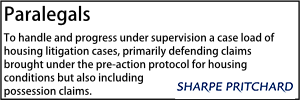
Careers
- Details
It is vital that lawyers learn to delegate if they are to cope with their workloads and reduce stress. LawCare provides some pointers on how to do it successfully.
Sheer volume of work is one of the major causes of office stress. Being overloaded with work means that there is a temptation to stay later in the office, to rush matters and to neglect to take much-needed breaks and holidays. Saying a firm “No” to additional work is sometimes essential.
Delegation, where possible and appropriate, can make all the difference. Proper delegation to a trainee, colleague, paralegal or secretary gives them a chance to develop new skills and demonstrates your faith in their abilities, whilst reducing your burden. Remember too that it is possible to delegate upwards. If you find yourself charged with a task which you feel you are not fully qualified to deal with, then it is prudent to ask a more senior colleague to take it on.
Delegation is a skill to be learned, like any other, and can be divided into six key areas:
1. Decide
Make an active decision to give tasks to your colleagues, and think about which jobs you can pass along.
2. Divide
Don’t give all your tasks to one person. Recognise the strengths of various people and assign matters accordingly.
3. Deliberate
Discuss with your colleague what you are planning to delegate and why, and give them a chance to comment.
4. Demonstrate
You may well have to provide training or help; be prepared to do so, even if it seems that it may be quicker to do it yourself. Remember that next time that person will know how to assist without training.
5. Dismiss
Dismiss your ownership of the task and accept that whilst someone else may not do it your way, it does not matter as long as it is done to the utmost of his or her ability.
You will also need to dismiss the nagging thoughts that dissuade you from delegating:
- "If you want it done right, do it yourself": This is not necessarily true, and you are unlikely to do a good job if you are stressed by overwork.
- "I’m not organised enough to delegate": It doesn’t take much organisation. Take a little time to identify tasks that can easily done by someone else and then diarise a date to check on their progress later.
- "My colleagues aren’t capable": Have more faith in your colleagues; they are professionals just as you are. You may need to give them a little extra training in some cases, but this will be worth the time spent and will be an opportunity for growth for them.
- "My colleagues are too busy": Don’t assume this to be the case until they tell you it is. Discussing the task with a colleague first gives them the opportunity to say no if necessary.
- "They won’t do it my way": Their way may be just as effective, and you may even learn something.
6. Determination
You can do it! It will be worth it!
LawCare’s hotline is 0800 279 6888. It is open 9 am to 7.30 pm on weekdays, and 10 am to 4 pm at weekends and on bank holidays. For more information, go towww.lawcare.org.uk.
- Details
Deadlines are a part of every lawyer's working life. LawCare looks at how you can keep on top of them and minimise the stress that they bring.
“I love deadlines. I like the whooshing sound they make as they fly by.”
Sadly, not all of us can have the relaxed attitude to deadlines that the late comic genius Douglas Adams, author of the Hitchhiker's Guide to the Galaxy, did. In the legal profession, a missed deadline or time limit can result in major problems for a client in being unable to pursue or defend a claim and the potential for a costs award against you, plus (in private practice) a possible negligence claim. For all lawyers, and particularly those working in litigation, deadlines are crucial and a fact of everyday life. They can therefore, not unexpectedly, also be a tremendous source of stress.
It is a fact of life that prolonged stress can lead to clinical depression. Depression is exhibited by symptoms that include an inability to concentrate, a lack of motivation or interest in anything, sleeplessness, overwhelming apathy and a sense of hopelessness. Depressed lawyers may make it in to work, but will not open the post – may even hide it, hoping that if they ignore it, it will go away. They will shuffle papers around, may even tap at the computer for a while, but will not get any productive work done. Depression and deadlines don’t mix. If you, or a colleague, seem to be suffering from any of these symptoms – including indifference to matters which might be regarded as urgent – this is too important to be ignored. See your GP immediately.
Whilst depression can be cured, stress related depression is best avoided in the first place. If deadlines are a major contributory factor to the pressure and anxiety you face, then learning to deal with them and to manage time well can avert problems later.
- Recognise that deadlines are necessary, and that they bring order and allow you to plan ahead.
- Especially if you have multiple deadlines, keep a calendar (virtual or real) with the deadlines clearly marked and put it where you can see it. You could also use this to plan your work towards these deadlines.
- Find out in advance what extensions and allowances are available, how important the deadline really is, and where possible, make a “Plan B” just in case you are unable to make the deadline despite your best efforts. Hopefully you will never need it, but knowing that you do have a contingency plan could help to alleviate the stress.
- Establish exactly what needs to be accomplished by the deadline.
- Break up all that needs to be done into smaller tasks and focus on them in turn, setting “micro-deadlines” for each if this helps. Focus on these plateaus rather than the whole looming mountain, and reward yourself each time you achieve something.
- Don’t procrastinate or put everything off until the last minute – if something goes wrong or something else crops up, you won’t have time to deal with the essentials to meet the deadline.
- Don’t be afraid to ask for help, either from a colleague or a superior, or to delegate parts of the work where appropriate.
- When planning towards the deadline, build in a little extra time to allow for unexpected setbacks or things which crop up.
- Prioritise carefully, thinking about how urgent and important each task is.
- Make a task list. Be realistic when listing the tasks you need to do each day and take satisfaction in crossing off tasks as you do them.
Deadlines can cause stress, but they are a necessary part of the legal profession and good client service. Learning to deal with them and work with them is an important part of being the best lawyer you can be. If you still find that you are not managing to keep up, then LawCare’s free and confidential helpline is available to you, 365 days a year.
LawCare’s hotline is 0800 279 6888. It is open 9 am to 7.30 pm on weekdays, and 10 am to 4 pm at weekends and on bank holidays. For more information, go to www.lawcare.org.uk.
- Details
The cutbacks in local government and the way they are being implemented by some councils present a potential threat to professional standards, Solicitors in Local Government chairman Steve Turner tells Philip Hoult.
It is clearly a challenging time for local government. So how do you see the state of play for lawyers in the sector?
There is undoubtedly an increasing workload at a time of diminishing resources. In my acceptance speech at the Weekend School in York last year, I put a marker down about the point being reached where that scenario starts to threaten professional standards. This issue remains a live one.
My principal concern – speaking generally and not personally – is that there still needs to be a recognition by employers that local authority solicitors are externally regulated and work to externally enforced professional standards. It would be not only remiss but an erroneous course were the employers to place their employed solicitors in a position where they could not comply with those standards. That threatens the professional integrity of the individual and is wrong, fundamentally wrong.
Are there particular scenarios where you see these pressures being brought to bear? Or is it across the board? Are solicitors being pressurised to wave things through?
There has got to come a point where the solicitor says no – that he or she cannot personally do something in the way or with the resources provided by the employer because it would breach the professional standards in such a way that their integrity would be undermined.
It manifests itself in several ways and it varies enormously from council to council, depending on how authorities have approached their budgetary problems.
The council that purely ‘salami slices’ without thinking is going to run into more problems than the council that actually analyses the effect of what is proposed and is prepared to vary the thickness of the slice if you like, according to the need to ensure that the service is delivered to the proper standards.
I had hoped that the majority of councils would have carried out an analysis of what services they had to continue to deliver and what services they had a discretion to deliver, which is the root of all local authority law as you know.
A lot of authorities have done that, but then you also come up against the political difficulty thrown up by the fact that the majority of discretionary services are what one might call the ‘soft and cuddly’ ones. These are the services which the politicians like and do not want to see cut because they are the ones that get them the votes. That is always going to be a difficult circle to square.
But, to be brutally honest, there are some councils that haven’t even carried out that thought process. They have just salami sliced irrespective and that is worrying. For the individual solicitor, this means: ‘Am I going to have the facilities available to me to actually carry out the job I need to do in the way that it should be done’.
That is the biggest worry, and that is setting aside entirely personal concerns about job security and family. It is a difficult place to be.
This also raises the question of the extent to which lawyers have been included in the decision-making process recently.
I think they are definitely being moved further and further away from the top table. You have only got to look at the figures of the number of chief execs or even monitoring officers who have a legal background today, and compare it with five years ago. The figures are way down. And in some structures there are more directors being interposed between the chief executive and the head of legal, which is increasing the distance between them.
So what can local government lawyers do about this?
That is an interesting one. As you know, we have been talking for some time with both the Law Society and with the Association of Council Secretaries and Solicitors (ACSeS) about lobbying for the monitoring officer being a statutory requirement and for that requirement to have a legal qualification behind it. Personally that is a course of action I would still like to see happen.
When that idea was first mooted, there were some strong opinions on both sides.
There are indeed. When we ran the consultation last year with the Law Society, we were quite surprised by the diversity of opinion. My personal view is that it continues to be a desirable way to go, particularly with the still increasing layers of legal bureaucracy that they use in local government process.
One of the big drivers for it was the standards regime and the fact that there were going to be more, if you like, quasi-judicial decisions being made at local authority level. I took the view that the need for a lawyer at the very top table was going to be essential and I haven’t been moved from that view.
What do you make of the widespread and sometimes radical changes in the structures for delivering legal services? Are they an opportunity or a threat for local government lawyers?
Every authority is absolutely right to consider how it obtains legal services, and to talk to its neighbours – talk to whoever – and see what can be done and whether there is an alternative method of delivery. If that is better for the client, and for the collective client if there are shared services, then I think that should be the way to go.
I see it as an opportunity, provided it is not solely savings driven. The interest of the client has got to come first. There has got to be of significant benefit to the clients in determining the way that authorities should share resources or whatever they’re looking at. If that is there, then I see it as a distinct opportunity.
I have no particular view on which of the many models is best. The Lincolnshire Legal set up has worked pretty well so far, it looks to be doing the job, but there are other models – Kent and so on – and there are many variables. There should be those variables and I think the cloth should be tailored according to the client need.
There are other developments down the track as well. There will be alternative business structures from October 6 2011, and with the White Paper on public services, there is the prospect of mutuals and social enterprises. It is not inconceivable for local authority legal teams to set up a mutual I suppose.
Authorities are absolutely right to consider all possible options and I don’t see any of those options as a threat – they should be viewed as an opportunity, they should be considered.
What other themes have you sought to develop up in your year as chairman?
The issue of professional standards has been the bedrock of my year. The other main emphasis has been on knowledge and the increasing need to share that knowledge.
I have said frequently that SLG’s greatest asset is the collective knowledge of its membership. The more ways we can find of sharing that knowledge for the benefit of all in terms of not only knowledge but best practice, the better.
How can you facilitate that if people are losing colleagues because they have been made redundant and if work levels are, if anything, increasing rather than simply staying the same?
By providing the tools and mechanisms that make the sharing of that knowledge easier, without impinging on training or travel budgets. So for example, at our SIG (special interest group) conveners’ conference last month, we spent some time looking at the concept of a virtual special interest group as opposed to a special interest group that physically met.
With the technology available these days, anything is possible in that sense. There are some good ideas coming out of that which we are hoping will be put into practice in the relatively near future. But I don’t want to devalue face to face opportunities, either in terms of tuition or meetings or simply plain networking. That still has an important place, because it is always going to be the interactive situation which is the best method of sharing knowledge and experience. You can’t get emotion into an email, even with today’s technology. Equally we must embrace what is possible with technology as it continues to grow.
We already have two national specialist interest groups. The childcare lawyers’ group, which Graham Cole chairs, is a combination of the occasional physical meeting and a lot of IT work and it is very successful. We also have the fire lawyers’ network, which joined us the best part of two years ago.
We are on the point of creating a third in that we have been in discussions and have come to an agreement in principle with lawyers who work for health trusts and health authorities. We are looking to bring them under our umbrella in terms of membership of the website and the facilities that go with that.
Do you think there is scope for a single organisation representing lawyers across the public sector?
There is a significant argument for a single voice but how wide an area that single voice should cover is open to debate. We have been in preliminary talks with ACSeS about not a merger or a takeover but the formation of something new to create a single voice for solicitors in local government. Those talks are ongoing.
We are somewhere close to an agreement in principle and if anything comes of that, then changes would be likely to be put to the 2012 AGM, for implementation either in the latter part of that year or 2013. There is a timescale and it is a realistic one.
The difficulty that was perceived at the start – about ACSeS’ non-lawyer membership – is not actually there. Lawyers now make up in excess of 95% of its membership. We are looking forward to those continued discussions and to see where we get to. But I do emphasise it would be something new we would be creating – it is not us following ACSeS or the other way round. We are looking for that single voice that is fully representational of all solicitors in local government.
What else is SLG doing to support local government lawyers, either generally or in their career development?
Career development is an interesting area. We have followed the Law Society lead and turned our trainee and newly qualified SIGs and groups into a junior lawyer division. It varies from branch to branch in ratio to the distribution of trainees, but we have got about half a dozen active JLD Sigs and they are led nationally by three representatives on the National Executive Committee.
They are active in career development, in terms of providing information to trainees and getting involved in career fairs. That is working well and there are strong linkages to the JLD division of the Law Society as well.
How is the relationship with the Law Society? It is fair to say that there have been tensions at some stages in the past.
Those relationships have continued to improve. It has not been tense for probably three or more years now as the Law Society has come to recognise one, the significant proportion of their membership that works in local government and two, the fact that we actually do things in a proper way. I think the Law Society respects and admires almost the way – of all the recognised groups – we provide for our membership and the things we do to represent our membership. You never forget at the end of the day that all our members are members of the Law Society anyway.
So why shouldn’t the relationship be a good one? Gone are the days that the Law Society appeared, on its public face at any rate, to exist solely for private practice.
Tell us about your career so far. How did you end up becoming a local government lawyer?
If you had asked me that question when I was at school, I would have laughed at you. I never considered law as a career and indeed did not get into law at all until I was about 24.
I fully intended when I was at school to have a flying career in the Air Force and my education was tailored towards that, with an emphasis on science. I did everything right to get into the Air Force apart from the fact that I had hay fever and they wouldn’t let me in. They wouldn’t even give me a ground job such as air traffic control, which I was really annoyed about.
I fell back on my second string, science, and ended up working for the local health authority doing histopathology and cytology in the labs for a few years. Then I had a dabble in retail management before I was asked completely out of the blue – by a territorial army contact – if I had ever considered training as a legal executive. I said, what’s a legal executive? Because I didn’t know.
My contact offered me a job in his firm, almost as an outdoor clerk, and that was the start of it. That firm sponsored me through a two-year legal executive associateship and a five-year part-time law degree (at Hull University). I decided to take a year out to do the Law Society Finals. I was exempt from articles – because by that time I had been admitted as a Fellow of the Institute of Legal Executives – and I was admitted to the Roll in December 1986.
It had always been my intention to go back to the firm that had sponsored my education, and we got into negotiations. Amazingly we couldn’t come to terms. They had paid me peanuts plus a little bit for the previous eight years and obviously paid for my legal education, which was extremely good of them, but I’m afraid I wanted considerably more than they were prepared to offer when I came back qualified.
So I took a rather brave step and went on the job market in the run up to finals. With the help of a headhunting firm in Leeds, I got over more than 20 requests for interview. I selected four and took a job at Langleys in Lincoln.
I became a salaried partner after two years and stayed at the firm for just over six years. Langleys then amalgamated with another Lincoln firm, but by that time the partnership pie became too small for any further equity partners to be made up in the foreseeable future. So I came back to Hull and worked with a firm here for two years.
It was in 1994 that I joined Humberside County Council, as it then was, working in Beverley where I had grown up and gone to school. But Humberside was disbanded two years later in 1996, when the four unitaries – East Riding, Hull, North East Lincolnshire and North Lincolnshire – were formed. I went to North Lincolnshire in Scunthorpe and I was there for seven and a half years, before coming to Hull City Council in December 2003.
I have had a mixed practice in local government. At Humberside I was primarily a contracts lawyer and a commercial litigator – indeed for something like 14 months of the two and a half years I was there I handled one piece of major litigation and nothing else, which was a very interesting experience. It was a massive case involving a claim against the council arising out of a CCT contract. It was a claim by the successful contractor, who claimed there had been misinformation under TUPE. The case ended up as a three-week trial at the Royal Courts in London. We carved it at the end – I reckon I saved the council £10m in the end on that carving, but there we go!
At North Lincs I again did a mixture – some environmental work, some regulatory prosecution, some employment, but principally procurement. Initially at Hull I continued what I had been doing at North Lincs, but from 2005 onwards I concentrated mostly on the top end of regulatory prosecution, heavy trading standards stuff and environmental health, food safety, that sort of thing. That occupies about 50% of my time while the other 50% is pure licensing. Hull has a very big night-time economy and it is also one of the proposed locations for one of the 16 large casinos. It’s a very full brief and thoroughly enjoyable.
I attended my first Weekend School when I was at Humberside and got actively involved on the branch side of SLG around 1999/2000. I became branch rep for Yorkshire and the Humber on the National Executive Committee before becoming National Knowledge Coordinator and then Deputy Vice-Chair three years ago. And here we are.
Philip Hoult is editor of Local Government Lawyer.
- Details
Drinking problems affect lawyers as much as any other part of society. However, their treatment needs may be different, writes LawCare.
Lawyers drink. It seems that every lawyer knows another who is enjoying rather too many liquid lunches with clients, or keeping a bottle of alcohol in a desk drawer.
LawCare was established in 1997 because of a perceived heavy drinking culture in the legal profession. Although LawCare’s helpline now takes calls from eight times more lawyers asking for help about stress than it does from those misusing alcohol, 80% of those who contact us seeking help for an alcohol problem blame their starting to drink on stress at work. This is not surprising, as alcohol offers a quick fix to the unpleasant side effects of long-term stress. At LawCare, we remain concerned about the high number of lawyers who are failing in their responsibilities to their firms, their clients, their families and themselves because of the amount they drink and the effect it has on them.
It’s not easy to help an alcoholic lawyer. For the general population, facing up to an alcohol or drug problem usually means going frequently to local meetings of Alcoholics Anonymous or Narcotics Anonymous, going to the family GP and perhaps being referred to the community alcohol service or a counsellor, or maybe even entering an inpatient addiction treatment unit for twelve weeks of intensive rehab paid for by the NHS.
Lawyers are different, however, and this approach to treatment may not always be appropriate for them, for a number of reasons:
- They are concerned about their reputation and career prospects if the world becomes aware that they are alcohol dependent
- They are concerned about the impact on the public image of the profession they represent
- They have had instilled into them the importance of confidentiality and, despite the assurances that the “Anonymous” part of AA is taken very seriously, are reluctant to make themselves vulnerable by announcing to a roomful of people that they are alcoholic
- The nature of the profession makes it extremely difficult for a sufferer to take an extended period away from work, especially if colleagues and superiors are not aware of the reason. Barristers, who are generally self-employed, are especially badly placed to take a twelve-week leave of absence, or give instructing Solicitors any clue that they might be struggling with an addiction
- Many lawyers are highly intelligent and well qualified professionals and fear that they will have little in common with many of the other people at AA meetings, so they refuse to attend.
For these reasons, LawCare offers specialist support to lawyers who are misusing alcohol or drugs. We have 58 lawyer volunteers across the country who are in recovery from an alcohol or drug addiction and stand ready to offer personal, and completely confidential, one-to-one help. We also have details of 52 accredited professional counsellors who are former (and sometimes still practising) lawyers and understand not only the difficulties of addiction, but also the stresses of day-to-day practice that might have led to the problem developing. An addicted lawyer calling the free LawCare helpline can be referred directly to these private counsellors, avoiding the need to visit his or her GP (although we do recommend this).
When it comes to inpatient treatment – shown to be the most effective way to overcome an addiction – one option is to be treated privately abroad. LawCare has details of centres in the USA and South Africa, but also closer to home, in the Algarve and Marbella. One advantage of being treated abroad is that a stay in a unit overseas (generally 3-6 weeks) can often be disguised as an extended holiday, and the lawyer can return to work with the appropriate tan and photographs, and explain their improved health and lifestyle on the benefits of the holiday. Also, up to 40% of those checking into addiction treatment find it too tough and leave before treatment is completed. The further away the treatment centre is from home, the more difficult it is to leave and the more likely it is that the patient will complete the course.
Even factoring in airfares, it can be cheaper to be treated abroad, especially when exchange rates are favourable. Addicted lawyers, however successful, often have limited funds to pay for private treatment due to the costs involved with maintaining an addiction, so this is a definite advantage. The better climate and pleasant surroundings can also make the process of detoxification and rehabilitation easier than it would otherwise be. Again, referrals can be made privately, without involving the GP, though involvement of the GP is always encouraged.
If you know a lawyer with an alcohol or drug problem, or if you are, or think you may be, a lawyer with an addiction, LawCare can offer you discreet and confidential help and support. LawCare’s free and confidential helpline is available to you, 365 days a year.
The hotline is 0800 279 6888. It is open 9 am to 7.30 pm on weekdays, and 10 am to 4 pm at weekends and on bank holidays. For more information, go to www.lawcare.org.uk.
- Details
Emma Khanna and Raj Sidhu say:
 "Local authorities are always open to considering candidates with a diverse and varied background. Our experience has shown us that newly qualified candidates from high street firms have many transferable skills which lend themselves well to the local government environment. Particular skill sets which are of interest to local authorities are, social services/childcare, housing, civil litigation, commercial property, planning and employment. Most recently there has been a growing tend for local authorities to hire newly qualified candidates from private practice firms who have completed a family seat and dealt with public childcare proceedings.
"Local authorities are always open to considering candidates with a diverse and varied background. Our experience has shown us that newly qualified candidates from high street firms have many transferable skills which lend themselves well to the local government environment. Particular skill sets which are of interest to local authorities are, social services/childcare, housing, civil litigation, commercial property, planning and employment. Most recently there has been a growing tend for local authorities to hire newly qualified candidates from private practice firms who have completed a family seat and dealt with public childcare proceedings.
"This is because there is an increasing demand for childcare lawyers due to the increase in care proceedings issued within social services. Newly qualified candidates from a private practice firm who have had exposure to public childcare work have often worked on a case, against a local authority so the experience and skills are very transferable and of interest.
"We find that the best route into a local authority for a newly qualified candidate from a private practice firm is to enter as a legal assistant, whereby the role would involve supporting a team of lawyers with their cases. Our experience has shown that candidates who take this route are very quickly given a small caseload of their own to manage and further build their experience and progress into a lawyer role. Our experience has also shown that newly qualified candidates from smaller private practice firms often have experience of managing their own cases whilst training and we find that this is of interest to busy local authority teams who look for candidates who can take on a caseload from the outset."
Paul Gilbert says: "If you are hard working, well rounded, articulate and have the strength of your convictions, the answer is yes, but the next twelve months will be particularly tough and new recruitment into any local authority team will not be the norm. Searching for new roles therefore will be tougher than ever, so ensure your networks are well developed, continue to work on your soft skills and be persistent."
"If you are hard working, well rounded, articulate and have the strength of your convictions, the answer is yes, but the next twelve months will be particularly tough and new recruitment into any local authority team will not be the norm. Searching for new roles therefore will be tougher than ever, so ensure your networks are well developed, continue to work on your soft skills and be persistent."

- Details
What can be done to generate goodwill amongst staff in the legal department in these difficult times? Richard Williams suggests some possible strategies.
The number of hours to be worked by a local government lawyer as set out in their Statement of Particulars has long since ceased to be an accurate reflection of their weekly time commitment. Even the standard Job Description qualification to this provision that from time to time you will be expected to work over and above the 40 hours (or thereabouts) has become the epitome of understatement.
As most employees choose public service, at least in part, to give something back to their community, it has not historically been a problem that legal managers have relied on a generous slice of goodwill to keep clients happy and to maintain or enhance service standards. In a year’s time, however, it is likely that the child protection solicitor who is wearily taking out the files from her briefcase at 9 pm after making tea and putting the children to bed because she is covering for a sick colleague at court the day after is also subject to one or more of a pay freeze or cut, no increment the previous April and car park charges. In a time of unprecedented austerity, how can leaders generate the goodwill amongst staff that is vital to deliver services and maintain the reputation of the legal function within the authority when they have less incentive than ever to offer it?
It is not possible to provide a detailed answer to this question in this article but I share some headline thoughts based on the experience of managing staff who have recently undergone unitary transition and many of whom have a new place of work, a new job and a new line manager to get used to along with the stringent savings measures that apply to all of us.
Performance Management
This may seem a strange “incentive” but we have a great opportunity to emphasise that performance review and reporting is not a stick to beat out incompetence but is a demonstrator of excellence and value.
As part of a new focus on performance management at Cornwall, we are engaged in a comprehensive process of Business Process Re-engineering. Streamlining the way we do things is not just about driving out inefficiencies but enables staff to eliminate the frustration of waste and to create a way of doing things that saves time, makes their lives easier and enables their work to be more rewarding.
We can easily make the false assumption that lawyers like to do things their own individualistic way and would resist attempts to standardise. The reality is that by taking duplication and delay out of the process, the client is happier and the lawyer has the benefit of a procedure that is shared and understood by the team but does not stifle personal flair or creativity.
Training
Pressure will be rightly applied to review and possibly reduce this budget but the preparation of a comprehensive Service Training and Development Plan is both a catalyst to do this and gives new momentum to approach training in a more innovative way. Lawyers should research and provide more training for their colleagues and clients and be encouraged to write legal articles. Both attract CPD and develop new skills and instead of sending individuals to London, we are looking to bring trainers to the Council to deliver more bespoke events to a greater number of staff. This means that there can be a consistency of approach across the Council so that a recent Procurement Law Update by a Barristers Chambers (expenses only!) was well-supported and received by the Procurement Team and senior client managers as well as a wide spectrum of legal staff.
It is also worth looking at imaginative management development – such as The Colour Works or Olivier Mythodrama – rather than the traditional legal discipline training courses we rely on for CPD points. We are also looking to train our managers … before they even become managers … thereby succession planning, investing in our junior lawyers who have potential to advance and who we cannot reward in direct financial terms and reducing their chance of failure if and when they are promoted.
Flexible working
By this I do not mean a “flexi time scheme” which over the last 14 years I have seen imprison rather than liberate staff. We are trying to set overall work objectives rather than expectations of presence in the office for a certain amount of time at certain times of the day. Investment should be made in the technology of home working and good quality open plan offices and managers should be helped to fulfil their responsibilities based on intelligent performance review rather than thinking that unless a direct report is chained to the adjacent office desk, they cannot be sure they are actually working.
A clear and confident vision
Local government legal services can try to survive these difficult times either by heading for the bunker or by seizing the opportunity a crisis presents us. In parallel with doing what we do better, we are going out to offer our services to Big Cornwall! We are good at what we do and we are going to persuade other public services in the county (and beyond) to use us or work with us. It is a demonstration of quality to our corporate masters and a resounding note of confidence in our sacrificial staff.
Taking positive measures to generate goodwill should not be a cynical ploy and reliance on staff working above and beyond the legal minimum should not be an excuse for poor or exploitative management. We cannot deny, however, that if we are to thrive in troubled times, we need our staff to be exceptionally motivated and productive and as leaders, we need to create the ethos and conditions that inspire that approach.
Ultimately, my child care solicitor should be able to watch House or indulge in Facebook when the kids are in bed but should she have to prepare cross-examination, the knowledge that the Service knows where it is going, is improving its processes, allows her to work from home when convenient and has identified her as a future manager and is backing that with effective training should help to generate the essential goodwill to go that extra mile!
Richard Williams is Head of Legal and Democratic Services at Cornwall Council
This article first appeared in ACSeS' Firing Up the Passion for Leadership Excellence. To get hold of a copy (for a nominal £10 to cover production costs) contact the Association of Council Secretaries and Solicitors at Afon Building, Worthing Road, Horsham, West Sussex, RH12 1TL; telephone: 01403 788249; e-mail:
Careers News Article Count: 529
Careers Features Article Count: 142
Page 106 of 112
Head of Governance & University Solicitor
Assistant Director - Legal & Governance
Director of Legal and Governance (Monitoring Officer)
Senior Lawyer - Advocate
Events

 Back to Basics: Construction Insurance and Insolvency - Devonshires
Back to Basics: Construction Insurance and Insolvency - Devonshires
16-07-2025 2:00 pm
Online (live)
 Institutional landlord series: Service and Notices – from Possessions to Injunctions and Requests for Access - 5 Pump Court
Institutional landlord series: Service and Notices – from Possessions to Injunctions and Requests for Access - 5 Pump Court
16-07-2025 4:00 pm
Online (live)
 HMPL Building Blocks: Tackling Non-occupation and Sub-letting - Devonshires
HMPL Building Blocks: Tackling Non-occupation and Sub-letting - Devonshires
17-07-2025
Online (live)
 To establishing whether Material Changes of Use have occurred - Ivy Legal Training
To establishing whether Material Changes of Use have occurred - Ivy Legal Training
18-07-2025 9:30 am
Online (live)
 Business and Property Masterclass #5: Interim Relief – Acting urgently and getting it right - Cornerstone Barristers
Business and Property Masterclass #5: Interim Relief – Acting urgently and getting it right - Cornerstone Barristers
10-09-2025 11:00 am
Online (live)
 Business and Property Masterclass #6: Rights of Light and Restrictive Covenants - Cornerstone Barristers
Business and Property Masterclass #6: Rights of Light and Restrictive Covenants - Cornerstone Barristers
23-09-2025
Online (live)
 HMPL Building Blocks: Service Charges & Ground Rent – Tackling Leasehold and Shared Ownership Arrears - Devonshires
HMPL Building Blocks: Service Charges & Ground Rent – Tackling Leasehold and Shared Ownership Arrears - Devonshires
14-10-2025
Online (live)
 Institutional landlord series: Possession – High Court Enforcement - 5 Pump Court
Institutional landlord series: Possession – High Court Enforcement - 5 Pump Court
22-10-2025 4:00 pm
Online (live)
 Institutional landlord series: Costs Recovery and Legally Aided Parties - 5 Pump Court
Institutional landlord series: Costs Recovery and Legally Aided Parties - 5 Pump Court
05-11-2025 4:00 pm
Online (live)
 HMPL Building Blocks: Law and Procedure Following Death of a Tenant - Devonshires
HMPL Building Blocks: Law and Procedure Following Death of a Tenant - Devonshires
09-12-2025
Online (live)
 HMPL Building Blocks: Legal Tools to Combat Anti-Social Behaviour - Devonshires
HMPL Building Blocks: Legal Tools to Combat Anti-Social Behaviour - Devonshires
17-02-2026
Online (live)

















































 A-Z Family Law: Take Two! - 42 Bedford Row
A-Z Family Law: Take Two! - 42 Bedford Row  Executive Programme in Public Procurement Law and Policy - University of Nottingham
Executive Programme in Public Procurement Law and Policy - University of Nottingham  Property Law Roadshow 2025 - Bristol - St John's Chambers
Property Law Roadshow 2025 - Bristol - St John's Chambers  CUBAS Comprehensive Training & Licencing (Manchester), September 2025
CUBAS Comprehensive Training & Licencing (Manchester), September 2025  AI in the Public Sector Conference - Westminster Insight
AI in the Public Sector Conference - Westminster Insight  Activism in the Workplace - 42BR Barristers Employment Law Annual Lecture
Activism in the Workplace - 42BR Barristers Employment Law Annual Lecture  DoLS Authoriser Training - LPS Law
DoLS Authoriser Training - LPS Law  Property Law Roadshow 2025 - Cardiff - St John's Chambers
Property Law Roadshow 2025 - Cardiff - St John's Chambers  Annual Fraud Conference 2025 - Oxford Investigation Service
Annual Fraud Conference 2025 - Oxford Investigation Service